Показать сокращенную информацию
Властно-административная организация средневекового общества и предпосылки возникновения европейского чиновничества
| dc.contributor.author | Лугвин, С. Б. | |
| dc.contributor.author | Савенко, А. Ю. | |
| dc.coverage.spatial | Гродно | |
| dc.date.accessioned | 2017-06-22T07:12:17Z | |
| dc.date.available | 2017-06-22T07:12:17Z | |
| dc.date.issued | 2017 | |
| dc.identifier.citation | Лугвин, С. Б. Властно-административная организация средневекового общества и предпосылки возникновения европейского чиновничества / С. Б. Лугвин, А. Ю. Савенко // Веснік Гродзенскага дзяржаўнага ўніверсітэта імя Янкі Купалы. Серыя 1. Гісторыя і археалогія. Філасофія. Паліталогія. — 2017. — № 1. — С. 118—127. | ru_RU |
| dc.identifier.uri | https://elib.gstu.by/handle/220612/16701 | |
| dc.description.abstract | Объект исследования - социально- политическая система европейского средневекового общества н процессы ее разложения в период формирования нацийгосударств. Целью работы является анализ институционального генезиса европейского чнноонччсства в контексте сушествования и упадка властное административной организации средневекового общества. | ru_RU |
| dc.description.abstract | The research object is socio-political system of the European medieval society and processes of its decomposition during the formation of nation-states. The purpose of the article is the analysis of institutional genesis of the European officials in the context of existence and decline of the imperious and administrative organization of the medieval society. In domestic literature this problem has not received the satisfactory decision yet In the main part of article the following lines of the European Middle Ages arc considered: domination of sacralized tradition, local dissociation of the social relations, prevalence of corporate and personal interrelations. These lines in many respects define features of its' imperious and administrative organization: extreme extent of decentralization of the political power, connection of land property and power, contractual nature of vassal-seigniorial relations, in the research also some advanced models of medieval administrative practice are considered: usage of clergymen in the management sphere, system of the organization of the power and management in the Roman Catholic Church, and also in the Byzantine empire. Further in the article the situation of decline of traditionalist orders which is shown in crisis of vassal-seigniorial control systems, emergence of commodity production and appearance of the nation-states is characterized- The considerable attention is paid to the analysis of processes of origin of the European officials, its such lines as lack of special preparation, uncertainty of powers, dependence on the monarch, prevalence of a personal discretion in management arc described. In the work it is noted dial positive impact on activity of officials was exerted by reception of Roman law. It promoted the statement of the beginnings of impersonality and formal rationality in the sphere of management. In die conclusion of die article it is drawn that during decomposition of the European traditionalism there was a number of prerequisites (origin of market economy, crisis of vassal-seigniorial control systems, formation of the nation-states, reception of Roman law. expansion of practice of officials hiring, etc.) which favored an approval of the constant officials drawn towards model of "rational bureaucracy" of M. Weber. The article can be useful to scientists, teachers, post-graduate students and students. | |
| dc.language.iso | ru | ru_RU |
| dc.publisher | Гродзенскі дзяржаўны ўніверсітэт ім. Я. Купалы | ru_RU |
| dc.subject | Средневековое общество | ru_RU |
| dc.subject | Medieval society | |
| dc.subject | Vassal relations | |
| dc.subject | Clergymen | |
| dc.subject | Nation-states | |
| dc.subject | Patrimonial bureaucracy | |
| dc.subject | Roman law | |
| dc.subject | Вассальные отношения | |
| dc.subject | Клирики | |
| dc.subject | Патримониальная бюрократия | |
| dc.subject | Римское право | |
| dc.title | Властно-административная организация средневекового общества и предпосылки возникновения европейского чиновничества | ru_RU |
| dc.type | Article | ru_RU |
| dc.identifier.udc | 321.17 | ru_RU |
